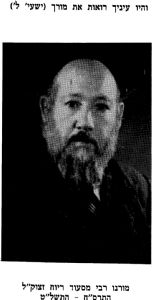A Short Tribute
Hacham Masoud Revach, son of A'ish, was born in 1908 in the village of Eskorah, near Marrakesh, Morocco.
Hacham Masoud Revach began to study at the Or Hatorah yeshiva in 1918, the year it was founded. After he reached Bar Mitzvah age, he went on to study at the Etz Haim yeshiva, led by Hacham Menahem Cohen. In 1925, at the age of 17, Hacham Masoud Revach was ordained to the rabbinate by Hacham Menahem Cohen.
Hacham Masoud Revach returned to Eskorah, where he married Aliza Dahan, daughter of Hacham Menahem Cohen, who served as the local rabbi.
Hacham Masoud Revach eventually relocated to the capital, Rabat, where he established a Talmud Torah and junior yeshiva. He set up Torah classes for the community's children, including those who attended non-Jewish schools. The community committee appreciated his work and supported him by constructing a large and lavish building.
Hacham Masoud Revach's work went well beyond education; he was appointed by Hacham Raphael Elnekawa and Hacham Yehoshua Birdugo to serve as head of the ritual slaughterers and as the rabbi in charge of the city's marriage and divorce court.
Hacham Masoud Revach visited the Land of Israel on several occasions. During one of his visits, in 1956, he contacted the Rasco Construction Company to purchase land and establish a moshav near the city of Ramleh. This was the year that Morocco had obtained its independence, and Hacham Masoud Revach was suspected of establishing ties with the State of Israel. One of his students, who served in the local police, warned him in advance that a search of his home was in the planning, and helped him avoid prosecution.
In 1962 Hacham Masoud Revach immigrated to Israel. He first settled in the city of Lod, where his close friend Hacham Yitzhak Abuhatzeira officiated as Chief Rabbi.
In 1965 Hacham Masoud Revach was invited to officiate as Rabbi of the city of Shlomi. He would remain in this role to the end of his life. He founded a yeshiva in Shlomi with Hacham David Danino, where he also taught.
Hacham Masoud Revach left this world on 10 Adar, 5739 (1979) and was buried in the city of Bnei Brak. After his passing, his grandson published Zichron Moshe, a book of Hacham Masoud Revach's articles and sermons.
